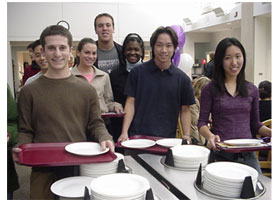French 'Gourmet University'
Offers Tasty Courses
April 3, 2004 - ET
PARIS (Reuters) - Want to get a degree qualifying you as a gourmet? Ever
felt like cooking a medieval meal?
Now's your chance.
France has created a gourmet university giving lessons in subjects ranging
from wine tasting to medieval cuisine.
About 70 places are available this fall for French and foreign students
eager to study in Reims, in the heartland of the Champagne region.
The conservative government has pointedly, and with a touch of irony, called
it a "Harvard for the art of French cooking."

It has produced the idea at a time when French wine exports are falling in
the face of stiff competition from "New World" wines and the United States
has banned foie gras imports.
One of the aims is to lure students from the United States and reverse
opinions being shaped by U.S. food writers who have taken to criticizing
French cuisine as lacking creativity.
The government wants to refresh the image of French cuisine, which suffered
when France and the United States fell out over the U.S.-led war in Iraq
(news - web sites) last year and pro-war groups urged Americans to boycott
French wines and "stinking" cheeses.
"Many French go to U.S. universities to study subjects these universities
have a good reputation in, such as business," Renaud Dutreil, the minister
for small business and consumption who launched the initiative, told
Reuters. "We're doing the same thing vice versa."
MEDIEVAL WEIGHT LOSS
Not just anyone can sign up. Students must already have some professional
experience in the food sector.
Executives in the food industry, restaurant managers, publicity agents,
academics or journalists are all seen as potential students at the Institut
des Hautes Etudes du Gout de la Gastronomie et des Arts de la Table.
The course costs 4,000 euros ($4,915). In four one-week sessions over the
year, students will learn about neurophysiology, psychology, economics, law,
food packaging and attend workshops to train their senses.
Historian Bruno Laurioux, one of the teachers, says he wants his students to
be inspired by the middle ages.
"When you think about medieval cuisine, heavy, greasy food comes to mind.
But that's not true at all. Medieval sauces were particularly light, based
on herbs and vinaigrette," he said.
He said old recipes, which will line the shelves of a library intended to
have all French cookbooks dating back to the 16th century, could help
students invent new dishes.
"I don't see why we shouldn't have a campaign like 'How to lose weight with
medieval cooking,"' he said.
In other classes, students will travel to vineyards and be taught by leading
chefs such as Alain Ducasse and Gerard Boyer.
Pierre Combris, an economist who will teach at the gourmet university, said
learning about a wide range of subjects would help professionals sell their
product.
"If you buy food, different aspects of the product interplay, such as
nutrition and health aspects, but also packaging. You have to take a global
approach today," he said.
Economists say the institute could help polish the image of French food
abroad and stimulate the economy, suggesting delicacies such as foie gras
were a major incentive for many tourists to come to France and spend money
there.
RESTING ON ITS LAURELS?
Dutreil hopes a trip to the United States will attract foreign students.
"We have to make an effort -- go abroad and open doors to people who want to
come to France to attend classes," he said.
U.S. wine lovers, and others abroad, have started to shun French wines for
wines from New Zealand, Australia, South Africa and South America.
A battle about the quality of French food also gained steam last summer when
New York food writer Arthur Lubow said French chefs had failed to move on
from "nouvelle cuisine" and had fallen behind a new generation of more
daring Spanish chefs.
French chefs were ready to protest but Dutreil says France might have to
become more modest and open to change.
"Maybe France has rested a bit on its laurels, given that it was the
birthplace of taste and 'savoir vivre,"' he said.
"I often tell people in France: 'You think you're the best in the world, but
there are new wines appearing in Chile and Australia. There are new cuisines
elsewhere which are very imaginative. You must never take anything for
granted."'
Coke Delays Dasani Introduction in Europe